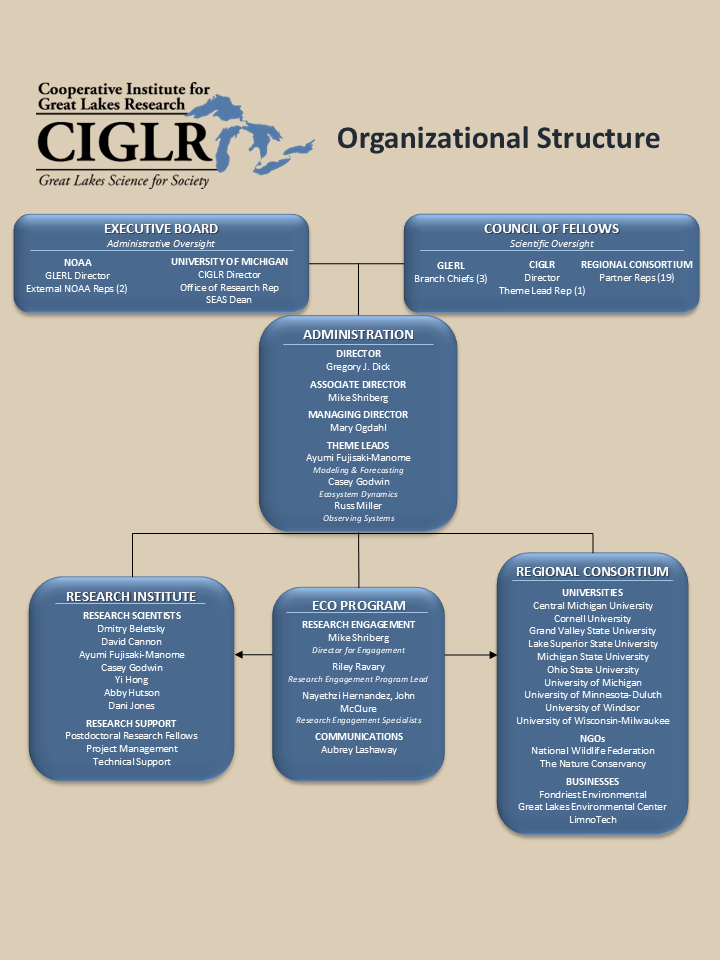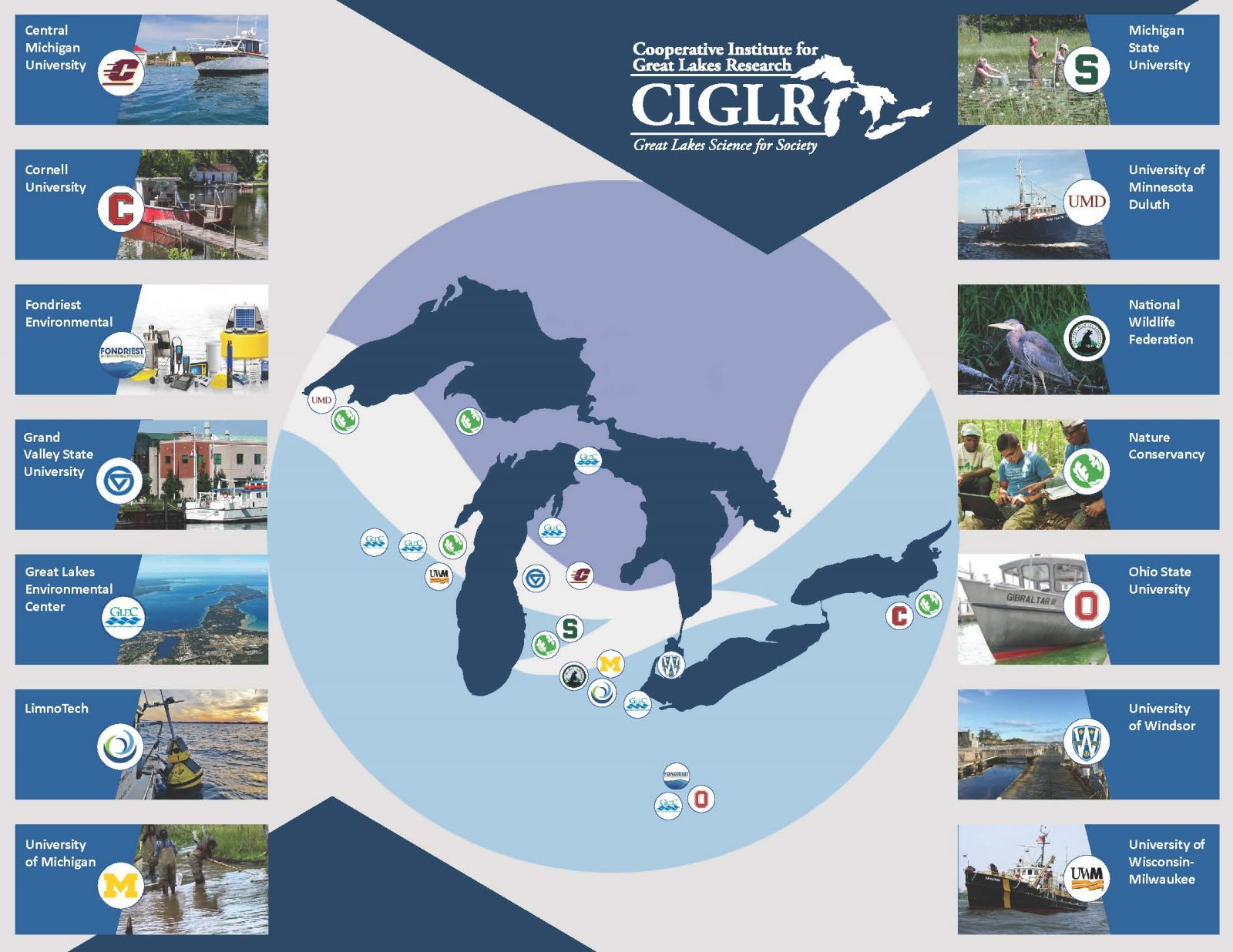CIGLR Organization
Research Institute
The CIGLR Research Institute complements NOAA’s workforce with a highly-skilled, permanent group of research scientists, postdoctoral fellows, technicians, staff, and administration that expands NOAA’s research expertise and is fully-integrated into NOAA’s scientific enterprise. All CIGLR Research Institute personnel hold appointments at the University of Michigan and are collocated with our sponsor, the NOAA Great Lakes Environmental Research Lab (GLERL).
-
- CIGLR Research Scientists serve as principal investigators on CIGLR Cooperative Agreement (NOAA) and external proposals, engage in collaborative research with NOAA scientists and Regional Consortium partners, and mentor undergraduates, graduate students, and postdoctoral fellows.
- CIGLR postdoctoral fellows work with CIGLR and GLERL Research Scientists to receive early career training in NOAA mission-related research topics in the Great Lakes.
- CIGLR research support staff work with CIGLR and GLERL principal investigators on technical aspects of their research projects.
Regional Consortium
The Regional Consortium broadens our research capacity, intellectual expertise, and geographic scope across the Great Lakes. Consortium partners include ten universities and five private sector organizations that collaborate with CIGLR and NOAA GLERL to conduct research, transition research to operations, and engage with stakeholders.
Consortium partners:
-
- Central Michigan University
- Cornell University
- Grand Valley State University
- Lake Superior State University
- University of Michigan
- Michigan State University
- University of Minnesota-Duluth
- Ohio State University
- University of Windsor
- University of Wisconsin-Milwaukee
- Fondriest Environmental
- Great Lakes Environmental Center
- LimnoTech
- The Nature Conservancy, Great Lakes
- National Wildlife Federation, Great Lakes Regional Center
CIGLR resources:
[Click image to expand]
Science Plan
Mission Statement: CIGLR’s mission is to lead research, develop applications and products, and engage with stakeholders to achieve environmental, economic, and social sustainability in the Great Lakes
Vision Statement: CIGLR’s vision is to be a trusted NOAA Consortium that brings an expanded research capacity with a multidisciplinary, multisector approach and broad geographic coordination, to inform decision makers and help meet grand sustainability challenges of the Great Lakes.
Goals and Objectives: To achieve CIGLR’s mission, we identified six over-arching goals within which all CIGLR activities are organized.
5-Year Proposal: For a copy of our proposal, please send an email to [email protected]
View our Goals and Objectives:
- Research institute. CIGLR operates a productive research institute that complements NOAA GLERL’s workforce with a highly-skilled, permanent group of research scientists, technicians, and staff that is fully integrated in GLERL’s scientific enterprise and serves to expand GLERL’s research expertise.
-
Regional consortium. CIGLR expands GLERL’s intellectual capacity and research infrastructure by building strong partnerships with universities, NGOs, and private-sector partners who share similar research and management goals in the Great Lakes. Consortium partners include 9 universities and 5 private sector organizations that collaborate with CIGLR and NOAA GLERL to conduct research, transition research to operations, and engage with stakeholders.
- Science translation. CIGLR helps translate NOAA research in the Great Lakes into action-oriented, science-based products that meet the needs of end-user stakeholders like natural resource managers, businesses, public utilities, and citizen users of data.
- Engagement (ECO Program). CIGLR supports informed decision making by working directly with legislators, resource managers, and other stakeholders to develop the research programs, tools, and information needed for decision making that promotes sustainability in the Great Lakes. We work directly with those who rely on our research tools and products to facilitate the co-production of research outcomes.
- Career development (ECO Program). Career development (ECO Program). CIGLR fosters the development of a skilled workforce by providing career training for undergraduates, graduate students, and postdoctoral fellows who will become the next generation of NOAA and Great Lakes scientists.
- Outreach & communications (ECO Program). CIGLR advances Great Lakes environmental literacy by communicating the value, importance, and usefulness of NOAA’s research to the public using various types of media, including social, newsletters, website, public lectures, and public outreach events.
Governance
Executive Board – Administrative Oversight:
-
-
- Reviews, providing recommendations on, and approving CIGLR’s Strategic Plan.
- Makes recommendations to CIGLR’s Director concerning the administrative budget.
- Approves appointments for the Council of Fellows.
- Reviews the annual budget and progress report of the CI.
- Reviews agreements or addenda to CIGLR’s Cooperative Agreement, as may be entered into in the future, and making recommendations about such agreements to the Director.
- Reviews general policies of CIGLR and initiating appropriate recommendations.
- Assures that CIGLR maintains a basin-wide approach in the Great Lakes and fully engages the Regional Consortium in research, outreach, education, and communications.
Executive Board members:
-
-
-
-
- Carl Gouldman – Director, U.S. IOOS Office, NOAA National Ocean Service
- Deborah Lee – Director, NOAA GLERL (Ex-Officio)
- Brad Orr – Associate VP, Natural Sciences and Engineering, University of Michigan
- Jonathan Overpeck – Samuel A. Graham Dean, School for Environment and Sustainability, University of Michigan
- Scott Lundgren – Director, NOAA Office of Response and Restoration
-
-
-
-
Council of Fellows – Scientific Oversight:
-
-
- Provides leadership in maintaining high standards of research for the CI.
- Analyzes the CI’s programs and science direction, identifying critical research needs, and recommending new research foci.
- Advises CIGLR’s Director on selection of new Council of Fellows members and reappointment of current Fellows.
- Makes recommendations to the CIGLR Director on the selection of Visiting Fellows.
- Reviews grants and applications for non-administrative programs, including the Postdoctoral Fellowships, Visiting Fellows, and Graduate Research Fellowships, and making recommendations to the CIGLR Director about priority applicants.
Council of Fellows members:
-
-
- Karen Alofs – Assistant Professor, School for Environment & Sustainability, University of Michigan
- John Bratton – Senior Scientist, LimnoTech
- Bret Collier – Ecosystems Dynamics Branch Chief, NOAA GLERL
- Patrick Doran – Associate State Director for Michigan, The Nature Conservancy
- Aaron Fisk – Professor, Great Lakes Institute for Environmental Research, University of Windsor
- Steve Fondriest – President, Fondriest Environmental
- Ayumi Fujisaki-Manome – Associate Research Scientist, CIGLR, University of Michigan
- Stuart Jones, Director, Annis Water Resources Institute, Grand Valley State University
- Rebecca Klaper – Associate Dean/Professor, School of Freshwater Sciences & Director, Great Lakes Genomics Center, U. Wisconsin-Milwaukee
- Phanikumar Mantha – Professor/Associate Chair for Graduate Studies, Michigan State University
- Dennis McCauley – President and Principal Research Scientist, Great Lakes Environmental Center
- Rebecca Meuninck – Regional Executive Director, National Wildlife Federation Great Lakes Regional Center
- Ashley Moerke – Professor & Director of the Center for Freshwater Research and Education,Lake Superior State University
- Lacey Mason – OSAT Branch Chief, NOAA GLERL
- Lars Rudstam – Director, Shackelton Point Field Station, Cornell University
- Catherine O’Reilly – Director Large Lakes Observatory & Professor of Earth & Environmental Sciences, Univ. of Minnesota-Duluth
- Hunter Carrick – Professor, Aquatic Ecosystems Ecology, Central Michigan University
- Andrea Vander Woude – IPEMF Branch Chief, NOAA GLERL
- Chris Winslow – Director, Stone Laboratory, Ohio Sea Grant, Ohio State University
-
-
-


